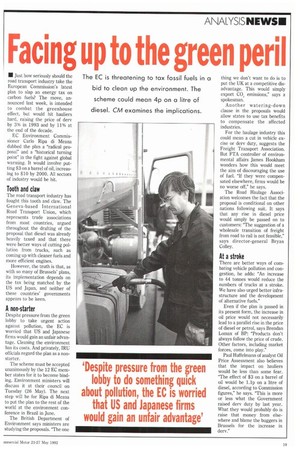Facing up to the green peril
Page 21

If you've noticed an error in this article please click here to report it so we can fix it.
The EC is threatening to tax fossil fuels in a bid to clean up the environment. The scheme could mean 4p on a litre of diesel CM examines the implications.
• Just how seriously should the road transport industry take the European Commission's latest plan to slap an energy tax on carbon fuels? The move, announced last week, is intended to combat the greenhouse effect, but would hit hauliers hard, raising the price of dery by 3% in 1993 and by 11% at the end of the decade.
EC Environment Commissioner Carlo Ripa di Meana dubbed the plan a "radical proposal" and a "historical turning point" in the fight against global warming. It would involve putting $3 on a barrel of oil, increasing to $10 by 2000. All sectors of industry would be hit.
Tooth and claw
The road transport industry has fought this tooth and claw. The Geneva-based International Road Transport Union, which represents trade associations from most countries, argued throughout the drafting of the proposal that diesel was already heavily taxed and that there were better ways of cutting pollution from trucks, such as coming up with cleaner fuels and more efficient engines.
However, the truth is that, as with so many of Brussels' plans, its implementation depends on the tax being matched by the US and Japan, and neither of these countries' governments appears to be keen.
A non-starter
Despite pressure from the green lobby to take urgent action against pollution, the EC is worried that US and Japanese firms would gain an unfair advantage. Cleaning the environment has its costs. And privately, IRU officials regard the plan as a nonstarter.
The scheme must be accepted unanimously by the 12 EC member states for it to become binding. Environment ministers will discuss it at their council on Tuesday (26 May). The next step will be for Ripa di Meana to put the plan to the rest of the world at the environment conference in Brazil in June.
The British Department of Environment says ministers are studying the proposals. "The one thing we don't want to do is to put the UK at a competitive disadvantage. This would simply export CO, emissions," says a spokesman.
Another watering-down clause in the proposals would allow states to use tax benefits to compensate the affected industries.
For the haulage industry this could mean a cut in vehicle excise or dery duty, suggests the Freight Transport Association. But FTA controller of environmental affairs James Hookham wonders how this would meet the aim of discouraging the use of fuel. 'If they were compensated elsewhere, firms would be no worse off," he says, The Road Haulage Association welcomes the fact that the proposal is conditional on other nations following suit. It says that any rise in diesel price would simply be passed on to customers: "The suggestion of a wholesale transition of freight from road to rail is not feasible," says director-general Bryan Colley.
At a stroke
There are better ways of combating vehicle pollution and congestion, he adds: "An increase to 44 tonnes would reduce the numbers of trucks at a stroke. We have also urged better infrastructure and the development of alternative fuels."
Even if the plan is passed in its present form, the increase in oil price would not necessarily lead to a parallel rise in the price of diesel or petrol, says Brendan Lomax of BP: "Products don't always follow the price of crude. Other factors, including market forces, come into play."
Paul Huffelmann of analyst Oil Price Assessment also believes that the impact on hauliers would be less than some fear. "The effect of $3 on a barrel of oil would be 1.1p on a litre of diesel, according to Commission figures," he says. "This is more or less what the Government raised dery duty by last year. What they would probably do is raise that money from elsewhere and blame the buggers in Brussels for the increase in derv."




























































































